
Hong Kong sets 14-day quarantine minimum for arrivals from medium-risk countries
Anyone flying into Hong Kong from countries in the medium-risk category will have to undergo at least 14 days of quarantine starting from Friday after the government scrapped a plan to shorten the period for those who test positive for Covid-19 antibodies.
Chief Executive Carrie Lam Cheng Yuet-ngor on Tuesday announced the halt to the antibody programme, the second phase of which was set to take effect on Wednesday and would involve testing on arrival at the airport.
She also apologised to residents affected by an earlier decision to tighten entry restrictions for arrivals from 16 countries, which threw travel plans into disarray for many.
The government issued a statement on Tuesday night saying fully vaccinated people – even those with positive antibody tests – returning to Hong Kong from medium-risk countries would face longer quarantine of 14 days based on an earlier suggestion by the Centre for Health Protection’s scientific committees.
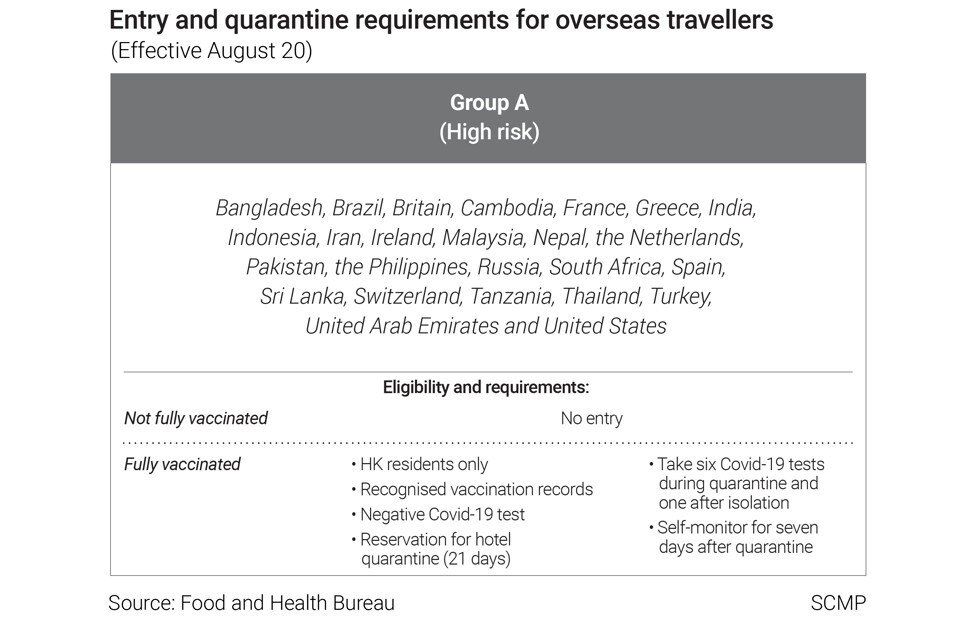
Visitors from those countries who had been vaccinated with both doses would also be allowed to enter Hong Kong from Friday, the statement said, the move coming amid a scramble for little over 10,000 hotel quarantine rooms, triggered by ever-changing quarantine rules.
Effective from Friday, medium-risk countries are all those not classified as falling into the other two categories, including Australia, Belgium, Canada, Colombia, Egypt, Germany, Italy, Japan, Kazakhstan, Kenya, Romania, Singapore, South Korea, Ukraine and Vietnam.
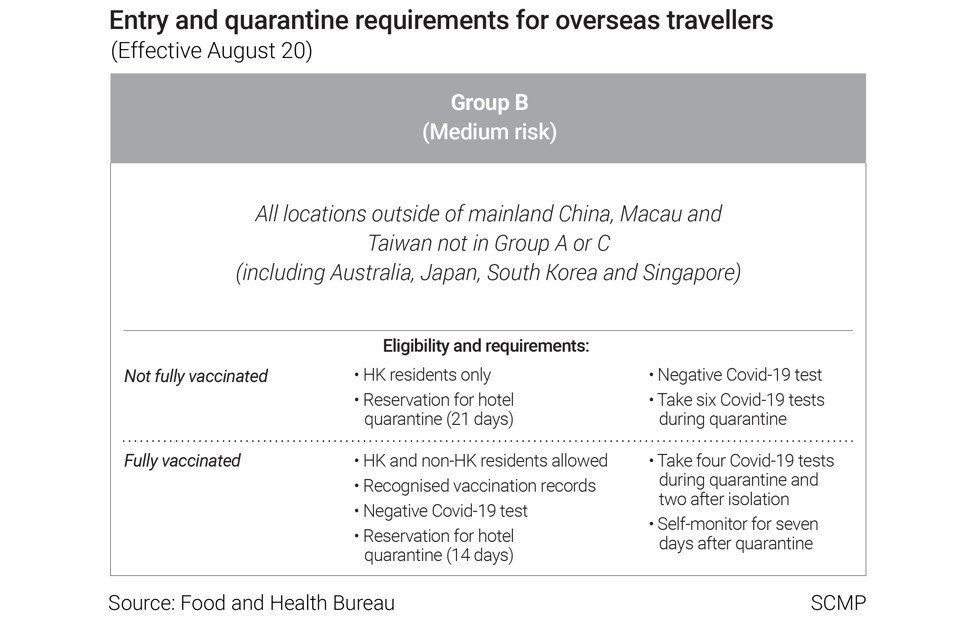
Under the current scheme, fully vaccinated travellers – residents or otherwise – who are in possession of a valid antibody test certificate and returning from a medium-risk country are able to quarantine for just seven days. Fully vaccinated travellers from low-risk countries are also eligible for one-week quarantine without the antibody test.
That plan for reduced quarantine was created based on the advice of experts, Lam said. The advice, however, had now changed in light of recent imported cases.
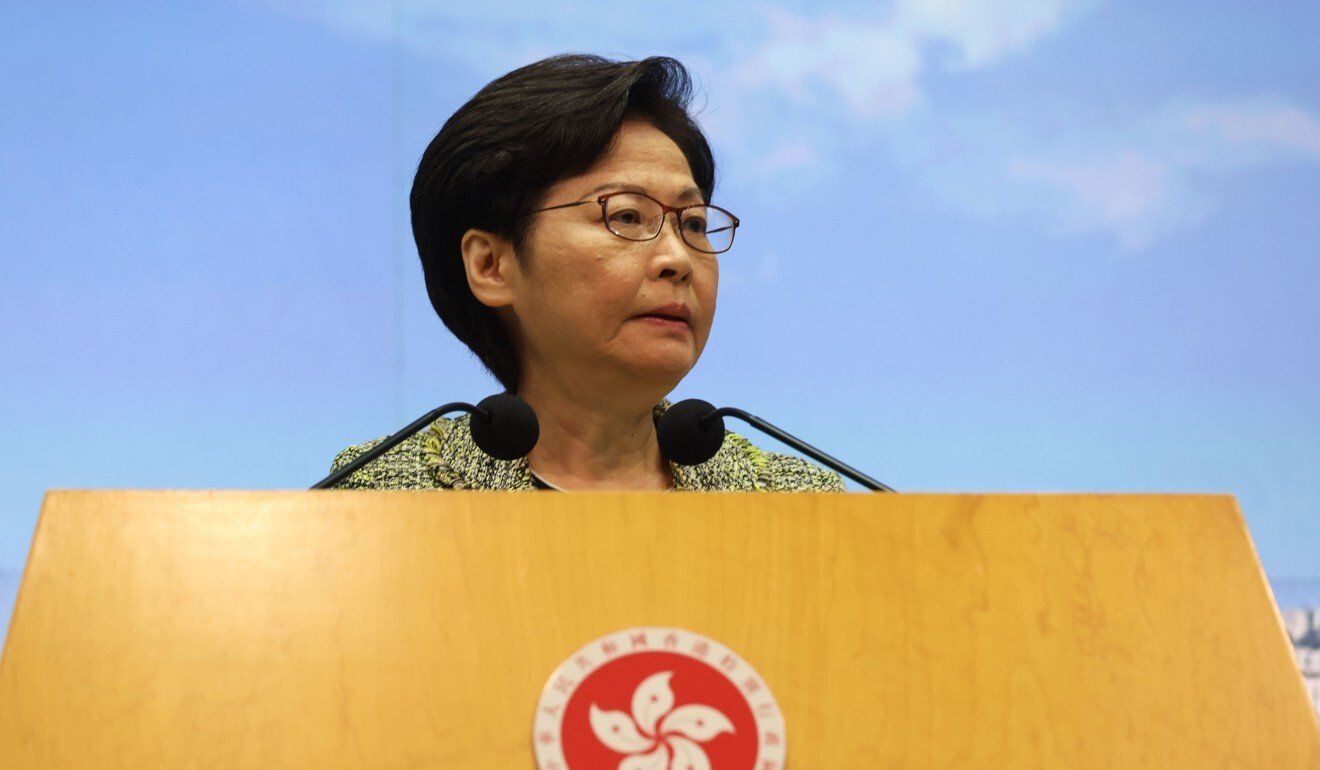 Chief Executive Carrie Lam addresses reporters on Tuesday.
Chief Executive Carrie Lam addresses reporters on Tuesday.
The decision to tighten travel rules was triggered by the case of a fully vaccinated Hong Kong domestic helper who tested positive for the more infectious Delta coronavirus variant after completing her seven-day hotel quarantine.
However, health experts also revealed on Tuesday that it was likely that the helper had been infected during her quarantine stay at a Wan Chai hotel.
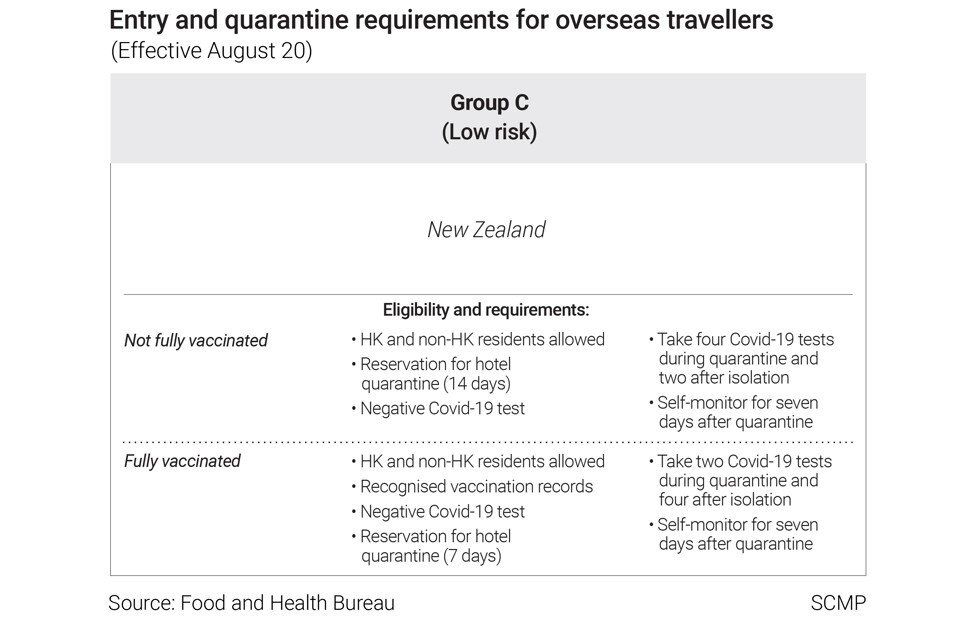
Genome sequencing showed that she carried the AY.3 sublineage of the Delta variant, identical to that of a couple who arrived on August 1 from the US on the same flight. They were staying opposite the helper’s room at the Dorsett Wanchai hotel.
Government pandemic adviser Professor Yuen Kwok-yung said the virus could have been transmitted on August 3, when respiratory specimens were collected from the infected couple.
The pair had left their window open, allowing contaminated air to flow out of their room. Furthermore, air flow in the two rooms were not up to standard, Yuen added.
The development came as the city confirmed three new Covid-19 cases, including one untraceable local infection.
The 47-year-old woman worked at an airline lounge in the city’s airport and tested positive for the Delta variant.
The remaining two cases were imported from Britain and Oman. The city’s official tally stood at 12,039 cases, with 212 related deaths.
“[The experts] advised us that with the prevalence of Delta in many places, it is better to err on the side of caution,” Lam said on Tuesday morning.
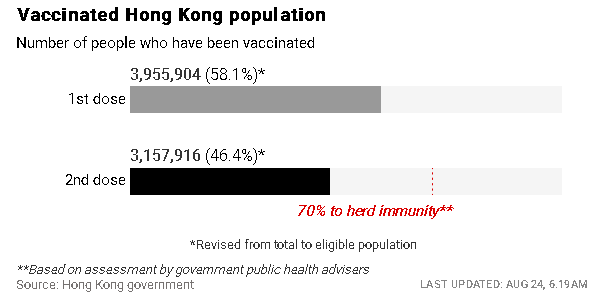
On the decision to drop antibody testing, the government said late on Tuesday: “The purpose of checking antibodies is to show evidence of response to vaccination. Under the updated recommendations, experts considered that the compulsory quarantine period can only be shortened to 14 days at most.
“As such, the government will tighten the vaccination record requirements, where fully vaccinated persons can only have their quarantine period shortened upon presentation of recognised vaccination records, and the quarantine period can no longer be further reduced with a positive serology antibody test result.”
The chief executive also said she felt sorry for those who had booked their hotel rooms for quarantine based on the now-scrapped scheme.
“I have to apologise to those who have been inconvenienced or had their plans disrupted as a result of this change in the use of the antibody test. But I hope they will understand that everything we are doing is to protect Hong Kong from another major outbreak,” she said.
“We do not want to reverse our decisions on a frequent basis … But sometimes in order to err on the side of caution in order to prevent the spread of the disease, we have to do it. And this is why we will, we are going to act in accordance with the experts’ advice.”
The chief executive noted that since the antibody test arrangement was announced on April 12, the government had held firm on the policy.
University of Hong Kong microbiologist Dr Ho Pak-leung, who was among those calling for the tightened quarantine measures, said while the government’s latest move was appropriate, health officials and the Airport Authority should also review their infection control measures.
A key issue to determine was if there were cross infections at airport lounges, where arrivals from countries with different risk levels might mingle.
“If arrivals from high-risk places can take off their masks inside the lounge and stay in the same area with other local passengers about to leave the city, or transit passengers from low-risk places, it is very likely that cross infections could happen,” Ho told a Monday radio show.
Respiratory medicine specialist Dr Leung Chi-chiu, who agreed that passengers mixing in lounge areas was less than ideal, said he believed there were airport loopholes that risked spreading into the community, urging workers there to get vaccinated and tested regularly to reduce risks.
Leung also said it was necessary to extend the quarantine period for those arriving from medium- and low-risk places to 14 days, as well as to tighten the entry restrictions of arrivals from high-risk places.
He also suggested that those allowed a seven-day quarantine period under the old rules should be traced by the government and even sent back to quarantine hotels to complete a full 14 days.
From Friday, the high-risk countries are: Bangladesh, Brazil, Britain, Cambodia, France, Greece, India, Indonesia, Iran, Ireland, Malaysia, Nepal, the Netherlands, Pakistan, the Philippines, Russia, South Africa, Spain, Sri Lanka, Switzerland, Tanzania, Thailand, Turkey, the United Arab Emirates and the United States of America. The only member of the low-risk category will be New Zealand.
The government also announced on Tuesday it would keep most of the current social-distancing rules for another 14 days, until September 1.
However, there will be more regular Covid-19 testing of staff at catering businesses running type B operations from Thursday next week.
Staff will be required to undergo testing once every seven days, instead of the current 14 days. Fully vaccinated staff do not have to get tested.
Type B restaurants, one of the four operation models for eateries under the Covid-19 rules, are allowed to serve up to four people per table until 10pm.










